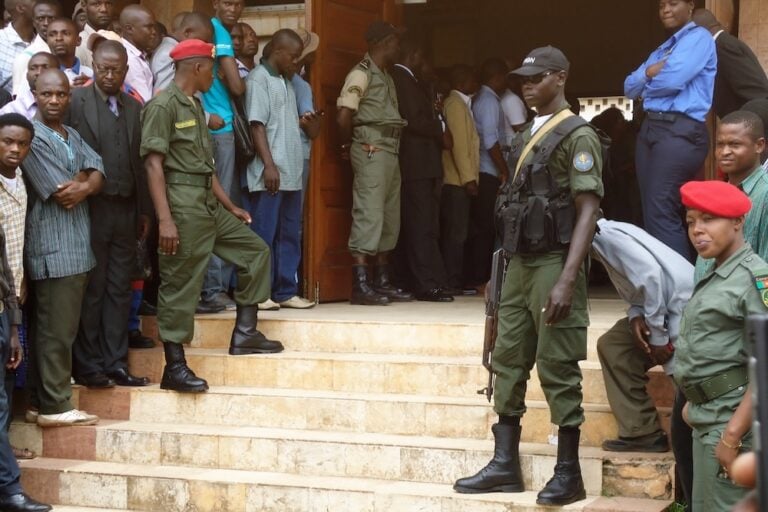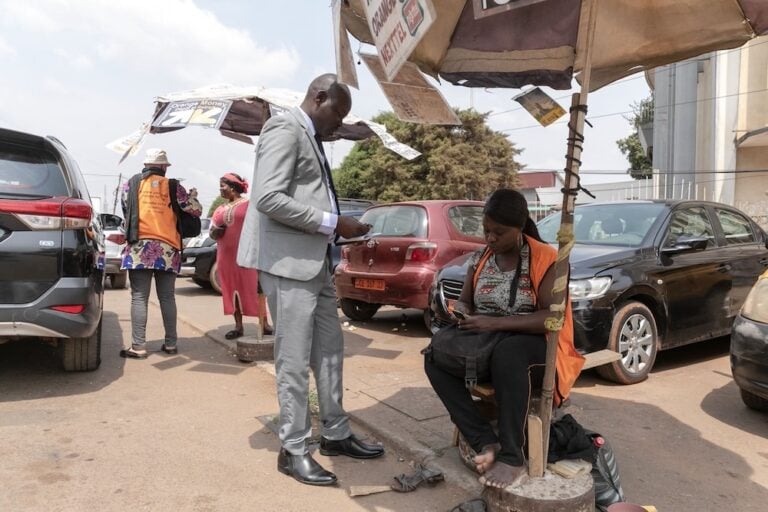(ARTICLE 19/IFEX) – The following is an ARTICLE 19 report: CAMEROON: SECRET SHAME OF ONE OF COMMONWEALTH’S NEWEST MEMBERS Today, with the Cameroon government due to report (1) to the UN Human Rights Committee, an international human rights group accuses it of perpetrating systematic and persistent human rights violations ranging from illegitimate detention to torture […]
(ARTICLE 19/IFEX) – The following is an ARTICLE 19 report:
CAMEROON: SECRET SHAME OF ONE OF COMMONWEALTH’S NEWEST MEMBERS
Today, with the Cameroon government due to report (1) to the UN Human Rights
Committee, an international human rights group accuses it of perpetrating
systematic and persistent human rights violations ranging from illegitimate
detention to torture and deaths in custody. ARTICLE 19, the International
Centre Against Censorship, also criticised the Commonwealth, which admitted
Cameroon’s government by the back door in 1995, for turning a blind eye to
official abuses of power by one of its newest members.
Andrew Puddephatt, Executive Director of ARTICLE 19 said:
“We call for an immediate end to the appalling abuse of power by the
authorities in Cameroon. Our new report contains a catalogue of just some of
the abuses against the media and political opponents. We fear that when the
next elections approach the situation will deteriorate even more.
“Since the Cameroonian government refuses to adhere to the most basic human
rights standards, the Commonwealth must lead the international community in
assisting them to guarantee the safety of their citizens,” he added.
According to personal testimony provided to ARTICLE 19 by Brice Nitcheu, one
of many journalists who have been forced into exile:
“Cameroon is a country where all dreams have been broken. The process of
transition to democracy, painfully started in the early 1990’s, is today in
enormous chaos.”
Anselme Mballa, Editor in Chief of Le Serment is another victim of the
system. He was sentenced to prison in July of this year in connection with
an article critical of a government minister, and is currently in jail.
An example of the contempt in which the Cameroonian government holds its
international commitments is illustrated by the way it responded to local
activists’ contributions to a visit by the UN Special Rapporteur on Torture
in May of this year. After the visit, human rights activist Abdoulaye Math,
who met with the Special Rapporteur, evaded an attack on his life –
fortunately, he was absent when government security officials surrounded his
home and threatened members of his family with a gun.
As a step towards addressing the appalling human rights situation, ARTICLE
19 has recommended that Cameroon is added to the remit of the Commonwealth
Ministerial Action Group as a serious and persistent violator of the Harare
Declaration, and that a mission led by the new Secretary General is sent
there immediately.
Journalists, human rights activists and supporters of opposition parties
appear to be key targets for abuse by the government. ARTICLE 19’s concerns
include the cases of 68 civilians who are facing trial by military tribunal
on politically-motivated charges. Most of the accused have spent more than
two years in custody, during which time at least six have died as a result
of abuse or lack of medical care.
ARTICLE 19’s report details more than a dozen of the many cases brought
against journalists over the last four years – three within recent months.
All involve disproportionate punishments, including huge fines and prison
sentences, for reporting which criticised or questioned figures of
authority, or otherwise offended those in power.
In addition to legal cases which seriously deter public debate, many
journalists have been arrested, questioned, detained without charge for
excessive periods, or subjected to attacks since 1995. Others have fled the
country after receiving death threats or becoming the subjects of
intimidation by security forces and police.
Brice Nitcheu is a journalist with the newspaper Bafang-Info, who became
involved with a campaign to support another journalist, Pius Njawé. His
personal testimony to ARTICLE 19, included in the report and sent to the UN
Human Rights Committee, describes his exclusion from his village by a
traditional court. His colleague, Firmin Ngaleu and his brother, a leader of
the political opposition, were not even summoned but received the same
punishment. The authorities also confiscated Nitcheu’s passport after
arresting and detaining him in appalling conditions.
“I am the only citizen of Cameroon, even maybe of Africa, who has been
forbidden both to enter his village and to leave the country,” commented
Brice Nitcheu.
In the face of absolute government control over the broadcast media,
newspapers are the chief means for the public to receive independent
information about matters of public interest. Hence, the authorities
regularly seize and ban newspapers, using laws introduced to restrict
freedom of expression in 1990 which remain on the statute books. For
example, in January 1999, 1000 copies of the weekly Mamy Wata were reported
to have been seized on public order grounds – apparently because the issue
carried a cartoon about the President’s personal life.
To access the report, Hollow Promises, Freedom of Expression in Cameroon
since 1995, on the Internet, visit the general Africa publications in the
publications section of ARTICLE 19’s website at www.article19.org.
1. In March 1999, the Cameroon government failed to appear before the
Committee, having been asked to attend and answer questions on their
periodic report.


